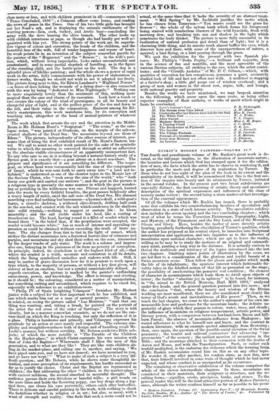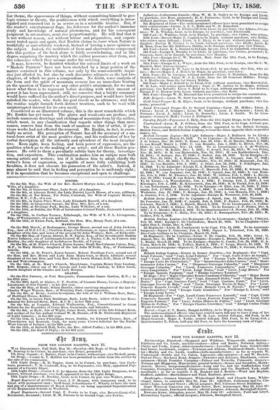RUSKIN' 8 MODERN P AL:STEMS—VOLUME IV.*
Tan fourth and penultimate volume of Mr. Ruskints great work is de- voted, as the titlepage implies, to the illustration of mountain-nature ; the beauties and lessons which God has stamped upon it for the edifica- tion of men, the facts which the artist has to observe in rendering it, and in particular the mode and degree of its realization by Turner. By those who do not lose eight of the plan of the book in its extent and the multiplicity of its detail, it will be remembered that this is the first sec- tion of the inquiry into beauty and its attainment by Turner, initiated in the second volume. In the present part two broad subdivisions are especially distinct ; the Brat consisting of artistic theory and speculative description of the spiritual expression and influences of the class of scenery under review; the second being a stern matter-of-fact investiga- tion of the external appearances.
Of all the volumes which Mr. Ruskin has issued, there is probably none that exhibits his two counterbalancing faculties of speculation and observation in a state of such intense activity. The speculative subdivi- sion includes the seven opening and the two concluding chapters ; which treat of what he terms the Turnerian Picturesque, Topography, Light, and Mystery, of the Firmament and the Dry Land, and• of the Mountain Gloom and Glory. Here,. besides the matter of more directly artistic bearing, peculiarly furthering the elucidation of Turner's qualities, which the author has proposed as his central object, he launches into Scriptural interpretation and application, and-into inquiries as to the influence of mountains upon national character ; which are apt to leave the reader, willing as he may be to study the motions of an original and extraordi- nary mind, panting a long way in the distance. It is actually curious to thread the multitude and intricacy of the topics introduced into the last two chapters. Omitting minor points of illustration by the score, we are led first to a consideration of the glorious and joyful beauty of a Swiss mountain scene. Then follow the gloom and squalor which mark the life of its inhabitants ; the spurious interest which fashionable fri- volity takes in the falsified notion of that life as presented on the stage:; the possibility of ameliorating the peasants' real condition ; the element of character m mountaineers which leads them to dwell upon objects of terror; the further "absolute joy in ugliness" to be found, for instance, in "the missal in the British Museum, Harl. MSS. 1892," analyzed under five heads, and the general question pursued into five more.; and the conclusion " that, where the beauty and wisdom of the Divine working are most manifested, there are also manifested most clearly the terror of God's wrath and inevitableness of His power." Then, as we reach the last chapter, we come to the author's statement of his own im- measurable love and preference for the mountain lands ; the definite su- periority of glory which they possess in colour, water' trees, and clouds ; the influence of mountains on religious temperament, artistic power, and literary power' with a comparison between lowland-born Bacon and hill- born. Pascal; the absence of mountain-influence from Shakspere ; his rooted adherence to what he himself saw and knew, and the contrast in modern literature, with an example quoted admiringly from Browning ; then, once again, the question of the possible social elevation of the Swiss peasantry ; the tourist and railroad contractors' fast advancing "im- provements " of the scenery ; the earliest mention of mountains in the Bible ; and the meanings attached to their connexion with the deaths of Aaron and Moses, and with the Transfiguration. Such, or rather such tenfold-multiplied, is the embarras des richeases which the teeming brain of Mr. Ruskin accumulates round him on this as on any other topic. No wonder if, one after another, his readers stare, as now this, now that, finds himself involved in some train of thought which he had never expected, and whose conduct is as unexpected as its occurrence.
The remaining or observative subdivision of the volume comprises the
whole of the eleven intermediate chapters. In these, mountains are considered in -their materials, their sculpture or structure, and the re- sulting forms,—aiguilles, crests, precipices, banks, and stones. To the general reader this will be the least attractive portion of Modern Painters; since, although the writer confines himself as far as possible to his pecu- • Modern Painters. Volume IV. Containing Part V.: Of Mountain Beauty. By john Rudd*, XI., Author of " The Stones of Venice," 4c. Published by Smith, Elder, and Co. liar theme, the appearances of things, without committing himself to geo- logic science or theory, the positiveness with which everything is inves- tigated and reasoned out is as severe as in a scientific treatise. But, if the reader's entertainment flags, his deference for the author's immense study and knowledge of natural phenomena, and for his consequent judgment in art-matters, must rise proportionately. He will find that A is not without reason, not without labour and preparation, and experi- ment tested again and again, that Ruskin claims to know when Nature is truthfully or untruthfully rendered, %stead of having a mere opinion on the subject. Indeed, the multitude of facts and observations compressed into this portion of the book alone is fairly overwhelming, and in like degree surprising the mastery which the author possesses over them, and the coherence which they assume under his ordering. It may, however, be doubted whether the natural limits of a work on _" Modern Painters" have not been stretched by a large portion of the matter contained in this volume, not only by the semi-scientific inqui- ries just alluded to, but also by such discursive adjuncts as the last two chapters, of which we gave a compendium. No doubt, some analysis. of the form and the spirit of mountain scenery has an immediate bearing on the question of Turner's or any other artist's attainment, for we must know what there is to represent before deciding with what amount of power it has been represented : still, we conceive that a briefer summary would have sufficed for the author's direct purpose, and would have better satisfied the reader' who finds his goal recede as he advances ; and that the residue might furnish forth distinct treatises, each to be read with uninterrupted interest for its own merit.
Considered as an illustrated volume, this is the most remarkable which Mr. Ruskin has yet issued. The plates and wood-cuts are profuse, and include numerous drawings and etchings of mountain-form by the author, which must, in any classification that regards other things than mere names, remove him from the rank of amateur to that of artist, if pre- vious works had not effected the removal. Mr. Ruskin, in fact, is essen- tially an artist. His perception of Nature has all the accuracy of a na- tural-born artist of the most positive class, and his realization of her by verbal description all the intensity and splendour of the most imagina- tive. Keen sight, • keen feeling, and keen power of expression are the qualities which go to the making of an artist ; and all these Ruskin in pos- sesses. He adds to them a peculiarly subtile turn for theory, investiga- tion, and exposition. This combination makes him an unique man both among artists and writers ; but if it induces him to adopt chiefly the writer's form of expression, as capable of more fully exhibiting both faculties, it does not obscure his possession of the artist's. Indeed, it may almost be said that in feeling and perception he is uniformly right ; it is in speculation that he becomes exceptional and open to challenge.



























 Previous page
Previous page